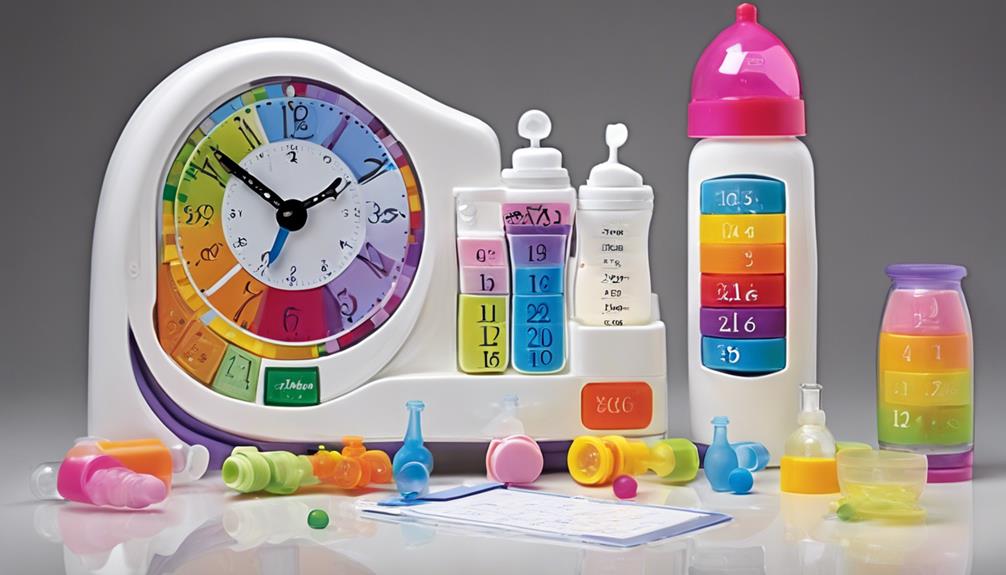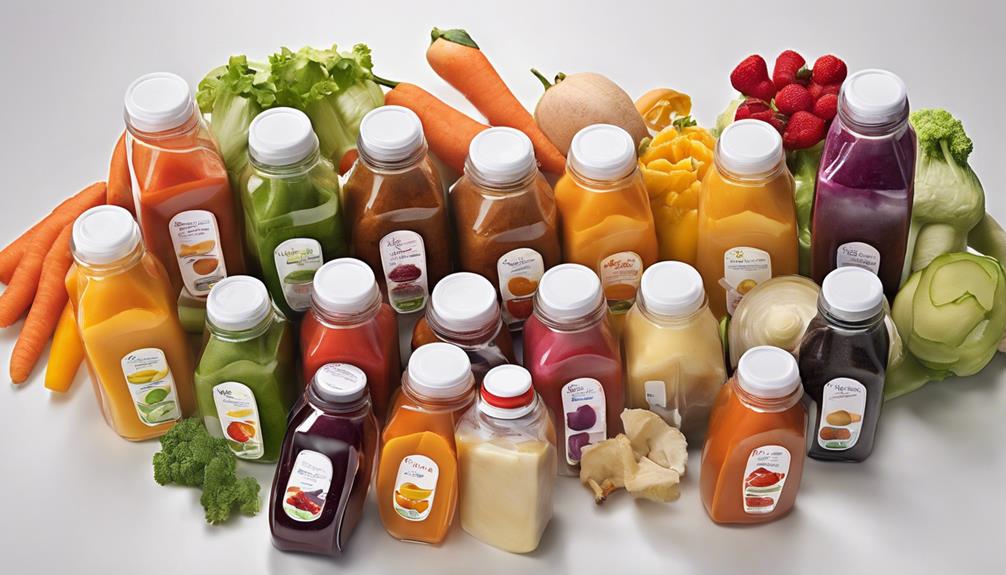Venturing into the world of nighttime formula feeding may feel like stepping into a dimly lit path, unsure of what lies ahead. But fear not, as we are here to guide you through this nighttime journey.
As caregivers seeking solace in the wee hours, we grasp the importance of a restful night for both baby and ourselves. Join us as we unravel the intricacies of formula feeding after dark, offering practical insights and guidance to ease your nighttime routine and promote peaceful slumber for your little one.
Key Takeaways
- Streamlined nighttime feeding process with ready formula for quick nourishment and return to sleep.
- Shared responsibilities and bonding opportunities for partners during nighttime feedings.
- Structured feeding schedule at night for predictability and essential nutrients for healthy growth.
- Setting up a comfortable and organized nighttime feeding station to facilitate the feeding process.
Benefits of Formula Feeding at Night
Formula feeding at night offers various advantages that can positively impact both parents and babies. When the baby wakes up hungry, having a bottle of nighttime formula ready can make feeding at night a smoother and quicker process. It guarantees that the baby is receiving the nourishment they need promptly, helping them settle back to sleep sooner. For exhausted parents, this means less time spent awake during those nighttime feeds, allowing for more restful sleep. Additionally, partners can take turns with nighttime feedings, fostering shared responsibilities and bonding opportunities with the baby.
Nighttime formula feeds also provide a structured feeding schedule, helping parents anticipate when the baby will need to eat during the night. This predictability can bring a sense of routine and stability to an otherwise unpredictable time. Supplementing with formula at night can be essential for babies who require extra nutrients for their growth and development. It guarantees that the baby is adequately nourished, promoting healthy development while offering practicality for families managing various responsibilities.
Setting Up Your Nighttime Feeding Station

Position your nighttime feeding station in a convenient spot near your bedside for easy access during those late-night feeds. To guarantee a smooth and efficient feeding experience, consider the following steps:
- Organize Items: Arrange all necessary items like bottles, formula, water, and any devices for cooling or warming in an easily accessible manner.
- Well-Lit Area: Make certain the area is well-lit or use a night light to aid visibility without disturbing your baby's sleep.
- Track Feeding Times: Keep a clock or timer nearby to monitor feeding times and intervals during the night.
- Create Comfort: Establish a comfortable and calming environment to foster a soothing atmosphere for nighttime feeds.
- Prepare the Station: Set up your feeding station to be a functional and peaceful space that promotes a sense of ease during those nighttime feeding sessions.
Step-by-Step Guide for Nighttime Formula Preparation
When preparing formula at night, it's essential to follow a step-by-step guide for safe and efficient nighttime feeding. Begin by boiling fresh tap water and using it within 30 minutes for formula preparation. Pour the boiled water into a sterilized bottle, add the correct amount of formula powder, and shake well. Next, cool the bottle to body temperature using methods like iced water, cold running water, or specialized products. Remember to keep the bottle lid on during cooling to maintain hygiene and safety.
It is important to emphasize that using a flask to keep boiled water hot for nighttime feeds isn't recommended due to prolonged heat retention, which could compromise the safety of the formula. By following these steps meticulously, you can guarantee that your baby's nighttime feeds are prepared with the utmost care and attention to detail. Prioritizing hygiene and safety in formula preparation is paramount for your little one's well-being during those late-night feedings.
Strategies for Soothing Baby Back to Sleep

After ensuring the formula is prepared safely, it's important to employ gentle techniques to soothe your baby back to sleep. Here are some effective strategies for comforting your little one during nighttime feedings:
- Offer comfort: Gently pat or rock your baby after feeding to help them relax and drift back to sleep.
- Create a soothing environment: Use white noise or soft music to establish a calming atmosphere that promotes sleep.
- Establish a bedtime routine: Consistency is key; a predictable routine signals to your baby that it's time for sleep.
- Minimize stimulation: Avoid bright lights or engaging activities during nighttime feedings to help your baby settle down.
- Consider a pacifier: A pacifier can aid in self-soothing, assisting your baby in falling back asleep after their feeding.
Troubleshooting Common Nighttime Feeding Issues
Addressing common nighttime feeding issues requires a thoughtful approach that considers both the baby's needs and the parent's strategies for promoting restful sleep. When your baby wakes frequently at night for feeds, it can be exhausting and concerning.
Troubleshooting these nighttime disruptions involves investigating potential reasons for your baby's discomfort during feedings. It might be helpful to try different soothing techniques, such as gentle rocking or white noise, to guarantee calming your baby during nighttime feedings. Establishing a calming bedtime routine can also contribute to better sleep for both you and your little one.
Additionally, adjusting feeding schedules to make sure your baby is getting enough during the day can help minimize the need for frequent nighttime feeds. By troubleshooting common nighttime feeding issues and prioritizing your baby's sleep, you can work towards creating a more peaceful and restful nighttime routine for your family.
Frequently Asked Questions
How to Do Formula Night Feeds?
We make formula night feeds easy: boil fresh water, add powder to a sterilized bottle, cool it down, and keep the lid on for hygiene. Avoid using a flask for night feeds due to heat retention concerns.
How Often Should I Feed My Baby Formula at Night?
We feed our baby formula at night based on hunger cues, typically every 2-3 hours initially. As they grow, feedings may space out. By 6 months, many babies can sleep through without a feed.
How Do I Transition to Formula at Night?
We shifted to formula at night gradually, starting with the bedtime feed. It helped our baby sleep longer stretches. Monitoring their response and adjusting as needed based on comfort and feeding patterns was key. Our pediatrician's guidance was invaluable.
Can I Water Down Baby Formula at Night?
We should never water down baby formula, it's like diluting love – essential and pure. Our babies need the right nutrients for growth. Always follow instructions and consult a pediatrician if unsure. Let's keep our little ones healthy and thriving.
Conclusion
As we bid adieu to another night of formula feeding, let's remember the countless benefits it brings – like sleep deprivation and endless bottle washing.
Our nighttime feeding station stands as a beacon of hope in the darkness, a reminder that we aren't alone in this journey of love and exhaustion.
So here's to all the caregivers out there, armed with bottles and caffeine, enduring the night with love and exhaustion.
Stay strong, for morning will come, eventually.









